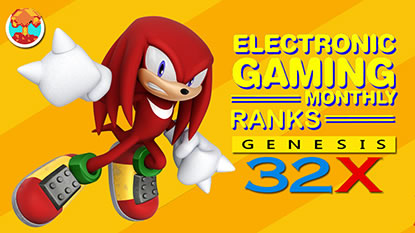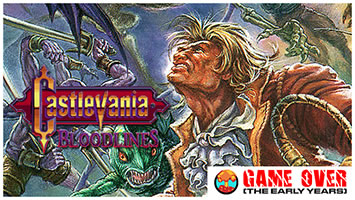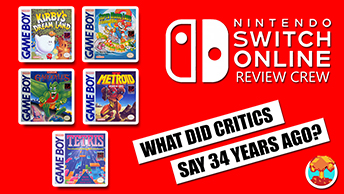- CLASSIC MAGAZINES
- REVIEW CREW
A show recapping what critics thought back
when classic games first came out! - NEXT GENERATION'S BEST & WORST
From the worst 1-star reviews to the best
5-stars can offer, this is Next Generation! - NINTENDO POWER (ARCHIVE)
Experience a variety of shows looking at the
often baffling history of Nintendo Power! - MAGAZINE RETROSPECTIVE
We're looking at the absolutely true history of
some of the most iconic game magazines ever! - SUPER PLAY'S TOP 600
The longest and most ambitious Super NES
countdown on the internet! - THEY SAID WHAT?
Debunking predictions and gossip found
in classic video game magazines! - NEXT GENERATION UNCOVERED
Cyril is back in this spin-off series, featuring the
cover critic review the art of Next Generation! - HARDCORE GAMER MAGAZING (PDF ISSUES)
Download all 36 issues of Hardcore Gamer
Magazine and relive the fun in PDF form!
- REVIEW CREW
- ELECTRONIC GAMING MONTHLY
- ELECTRONIC GAMING MONTHLY RANKS
From Mario to Sonic to Street Fighter, EGM
ranks classic game franchises and consoles! - ELECTRONIC GAMING MONTHLY BEST & WORST
Counting down EGM’s best and worst reviews
going year by year, from 1989 – 2009! - ELECTRONIC GAMING BEST & WORST AWARDS
11-part video series chronicling the ups and
downs of EGM’s Best & Worst Awards!
- ELECTRONIC GAMING MONTHLY RANKS
- GAME HISTORY
- GAME OVER: STORY BREAKDOWNS
Long-running series breaking down game
stories and analyzing their endings! - A BRIEF HISTORY OF GAMING w/ [NAME HERE]
Real history presented in a fun and pithy
format from a variety of game historians! - THE BLACK SHEEP
A series looking back at the black sheep
entries in popular game franchises! - INSTANT EXPERT
Everything you could possibly want to know
about a wide variety of gaming topics! - FREEZE FRAME
When something familiar happens in the games
industry, we're there to take a picture! - I'VE GOT YOUR NUMBER
Learn real video game history through a series
of number-themed episodes, starting at zero! - GREAT MOMENTS IN BAD ACTING
A joyous celebration of some of gaming's
absolute worst voice acting!
- GAME OVER: STORY BREAKDOWNS
- POPULAR SHOWS
- DG NEWS w/ LORNE RISELEY
Newsman Lorne Riseley hosts a regular
series looking at the hottest gaming news! - REVIEW REWIND
Cyril replays a game he reviewed 10+ years
ago to see if he got it right or wrong! - ON-RUNNING FEUDS
Defunct Games' longest-running show, with
editorials, observations and other fun oddities! - DEFUNCT GAMES QUIZ (ARCHIVE)
From online quizzes to game shows, we're
putting your video game knowledge to the test!- QUIZ: ONLINE PASS
Take a weekly quiz to see how well you know
the news and current gaming events! - QUIZ: KNOW THE GAME
One-on-one quiz show where contestants
find out if they actually know classic games! - QUIZ: THE LEADERBOARD
Can you guess the game based on the classic
review? Find out with The Leaderboard!
- QUIZ: ONLINE PASS
- DEFUNCT GAMES VS.
Cyril and the Defunct Games staff isn't afraid
to choose their favorite games and more! - CYRIL READS WORLDS OF POWER
Defunct Games recreates classic game
novelizations through the audio book format!
- DG NEWS w/ LORNE RISELEY
- COMEDY
- GAME EXPECTANCY
How long will your favorite hero live? We crunch
the numbers in this series about dying! - VIDEO GAME ADVICE
Famous game characters answer real personal
advice questions with a humorous slant! - FAKE GAMES: GUERILLA SCRAPBOOK
A long-running series about fake games and
the people who love them (covers included)! - WORST GAME EVER
A contest that attempts to create the worst
video game ever made, complete with covers! - LEVEL 1 STORIES
Literature based on the first stages of some
of your favorite classic video games! - THE COVER CRITIC
One of Defunct Games' earliest shows, Cover
Critic digs up some of the worst box art ever! - COMMERCIAL BREAK
Take a trip through some of the best and
worst video game advertisements of all time! - COMIC BOOK MODS
You've never seen comics like this before.
A curious mix of rewritten video game comics!
- GAME EXPECTANCY
- SERIES ARCHIVE
- NINTENDO SWITCH ONLINE ARCHIVE
A regularly-updated list of every Nintendo
Switch Online release, plus links to review! - PLAYSTATION PLUS CLASSIC ARCHIVE
A comprehensive list of every PlayStation
Plus classic release, including links! - RETRO-BIT PUBLISHING ARCHIVE
A regularly-updated list of every Retro-Bit
game released! - REVIEW MARATHONS w/ ADAM WALLACE
Join critic Adam Wallace as he takes us on a
classic review marathon with different themes!- DEFUNCT GAMES GOLF CLUB
Adam Wallace takes to the links to slice his way
through 72 classic golf game reviews! - 007 IN PIXELS
Adam Wallace takes on the world's greatest spy
as he reviews 15 weeks of James Bond games! - A SALUTE TO VAMPIRES
Adam Wallace is sinking his teeth into a series
covering Castlevania, BloodRayne and more! - CAPCOM'S CURSE
Adam Wallace is celebrating 13 days of Halloween
with a line-up of Capcom's scariest games! - THE FALL OF SUPERMAN
Adam Wallace is a man of steel for playing
some of the absolute worst Superman games! - THE 31 GAMES OF HALLOWEEN
Adam Wallace spends every day of October afraid
as he reviews some of the scariest games ever! - 12 WEEKS OF STAR TREK
Adam Wallace boldly goes where no critic has
gone before in this Star Trek marathon!
- DEFUNCT GAMES GOLF CLUB
- DAYS OF CHRISTMAS (ARCHIVE)
Annual holiday series with themed-episodes
that date all the way back to 2001!- 2015: 30 Ridiculous Retro Rumors
- 2014: 29 Magazines of Christmas
- 2013: 29 Questionable Power-Ups of Christmas
- 2012: 34 Theme Songs of Christmas
- 2011: 32 Game Endings of Christmas
- 2010: 31 Bonus Levels of Christmas
- 2009: 30 Genres of Christmas
- 2008: 29 Controls of Christmas
- 2007: 34 Cliches of Christmas
- 2006: 33 Consoles of Christmas
- 2005: 32 Articles of Christmas
- 2004: 31 Websites of Christmas
- 2003: 29 Issues of Christmas
- 2002: 28 Years of Christmas
- 2001: 33 Days of Christmas
- NINTENDO SWITCH ONLINE ARCHIVE
- REVIEW ARCHIVE
- FULL ARCHIVE
X-Men in 16-Bits: Analyzing Magazine Reviews of the 1990s
Professor X. Magneto. Mystique. Quicksilver. That chick from Attack of the Show. They're all together in the brand new X-Men movie, subtly titled Apocalypse. While critics seem to be split on Bryan Singer's newest superhero romp, fans are excited to see Oscar Isaac look like a Mighty Morphin' Power Ranger villain.
To help celebrate the brand new movie, we're taking a look back at the X-Men series during the 16-bit era. Join us as we analyze what magazines like Electronic Gaming Monthly, GamePro, Next Generation, Super Play and CVG thought of X-Men games released by Sega, Capcom and LJN. Which 16-bit game comes out on top? Find out as we explore X-Men in 16-Bits.
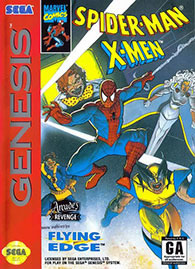
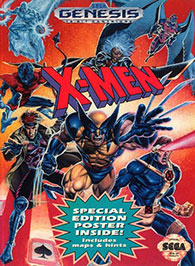
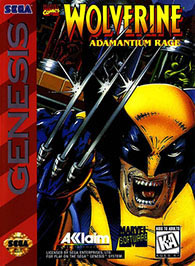
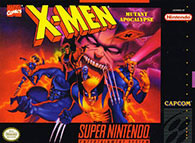
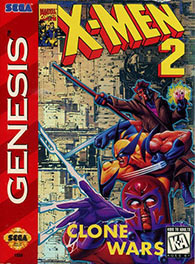

To help celebrate the brand new movie, we're taking a look back at the X-Men series during the 16-bit era. Join us as we analyze what magazines like Electronic Gaming Monthly, GamePro, Next Generation, Super Play and CVG thought of X-Men games released by Sega, Capcom and LJN. Which 16-bit game comes out on top? Find out as we explore X-Men in 16-Bits.

SPIDER-MAN & X-MEN: ARCADE'S REVENGE
Given their varied super-powers and over-the-top personalities, you would think that a great X-Men game would practically make itself. But LJN couldn't figure out the winning formula in the 8-bit era, unleashing critically panned games like The Uncanny X-Men and Wolverine. Unfazed, the Acclaim off-shoot went ahead with their most ambitious installment yet, Spider-Man and X-Men: Arcade's Revenge on both Genesis and Super NES.
Released November of 1992, this was a side-scrolling platformer where players switched between Spider-Man and Marvel's most famous mutants. This allowed Software Creation a chance to test out different play styles and level designs. It seemed to work out, with critics giving this reinvention high marks across the board.
GamePro gushed over the "excellent graphics, great gameplay, nice mix of challenges, fully digitized sound effects, and a radical heavy-metal soundtrack." They gave it a 4.5 out of 5. This isn't far off from Nintendo Magazine System, calling the game "a very challenging game indeed" that is "highly recommended, even if you don't like Marvel Comics." Electronic Gaming Monthly wasn't as sold, but did say it was a big improvement over past LJN efforts. Giving it an 8, Ed Semrad liked "the idea of having to play all five characters through two different events," and thinks LJN made a mighty fine game. On the other hand, Steve Harris complained that it's "little more than a series of mazes that are littered with obstacles and a minimal amount of enemies to overcome."
Seven months after the Super NES launched, LJN ported the game to the Sega Genesis with positive results. GamePro gave this version an even higher score, bumping it up to a perfect 5 out of 5 and noting the "sharp graphics and attention to detail." Force Mega also liked the game, with Mark giving it an 82% and concluded that "If you're a big fan of the genre, then you could do worse than Spider-Man and the X-Men." Not exactly a ringing endorsement, but I'll take it.

X-MEN
Seeing an opportunity to strike, Sega decided to try out their own X-Men game. Simply called X-Men, this 1993 Genesis exclusive takes place entirely in the Danger Room and sees players switching between the four popular heroes -- Wolverine, Gambit, Cyclops and Nightcrawler. Each character had their own fighting style and special abilities, something that will always be a big draw to the X-Men franchise.
Critics were immediately impressed with this brand new take on the superhero formula. GamePro gave it a perfect 5 out of 5, raving about the large, smooth-moving sprites, up-to-date costumes and the multi-scrolling backgrounds that have to be seen to be believed. Die Hard Game Fan agreed, calling it "Marvel-out." Skid notes that "somebody finally does the X-Men justice," a sentiment shared throughout the review crew. Other reviews include an 82% from Force Mega and an 88% from Mean Machines Sega.
While everybody else enjoyed Sega's version of X-Men, Electronic Gaming Monthly wasn't as convinced. Steve Harris gave it a 6 out of 10, complaining that "the X-Men is a cool license but this game manages only to capture the powers and skills of the best of the bunch, with little innovation along the way." Martin Alessi echoed those thoughts, saying that he "was not impressed by this cart very much. The graphics are mediocre and the animation leaves much to be desired." On the other hand, Sushi-X disagreed, arguing that "X-Men is loaded with more techniques than your average no-brainer side-scroller." He liked that "each player's abilities closely reflect the comic's descriptions, right down to the walking and jumping."

WOLVERINE: ADAMANTIUM RAGE
After gaining a little traction with Spider-Man and X-Men: Arcade's Revenge, LJN returned with not one, but two versions of Wolverine: Adamantium Rage. While both the Genesis and Super NES versions share similar bosses and story beats, they come from two different developers and are noticeably different. And when it came to critics in the 1990s, they definitely had a preference.
The Genesis game was roundly criticized, especially coming on the heels of Sega's X-Men. Al gave it a 3 out of 10, wondering "what happened to the controls?" On a more positive note, he said "the graphics are finely done, as are the music tracks, but the poor play control just totally overwhelms the positive aspects of the game." Sushi-X didn't hate it as much, but still concluded that "this is one tough game that would give the real Wolverine a tough time." Is Wolverine supposed to be a good gamer? I don't know, I haven't read the comics.
These sentiments were shared in Next Generation's 5th issue, where they gave it two stars and said that "Wolverine is a decent platform bralwer, but in the end it's just another platform brawler." On the other hand, both GamePlayes and Mean Machines Sega liked Wolverine on the Genesis, giving it scores in the mid-to-high 80s.
The Super NES version did fare a bit better, but still wasn't a critical hit. EGM said that "everyone's favorite X-Man fares pretty well on the Super NES." GamePro seemed to like it even more, giving it a 4.5 out of 5. Video Games magazine also liked it, giving it an 8. On the other hand, Super Play gave it a 60% and said that "apart from the brilliantly animated main sprite, there's nothing that distinguishes the game at all. It never gets it claws in."

X-MEN: MUTANT APOCALYPSE
Taking a page out of Sega's playbook, Capcom decided to release their own X-Men game in late 1994. X-Men: Mutant Apocalypse was exclusive to the Super NES and promised a new standard in graphics and attention to detail. Much like Sega's 1993 action game, you take control of several of the most popular mutants, including Wolverine, Psylocke, Gambit, Cyclops and Beast.
After so many miss-fires, Electronic Gaming Monthly was finally impressed with what Capcom was able to accomplish. "This is definitely the funnest video game version of X-Men that I've played," says Danyon Carpenter. Ed Semrad liked that this wasn't just another Final Fight clone, complimenting the Street Fighter-style fighting moves and great graphics. Giving it mostly 8s, this is definitely EGM's favorite X-Men adventure.
Die Hard Game Fan wasn't as generous, giving it a range from 70% all the way up to 78%. "X-Men, X-Men, X-Men ... enough!" complains Skid. "These aren't even cool characters." Nick Rox is a bit more snotty about it: "Excuse me? Uh ... this is CAPCOM we're talking about here?? This game deserves a hearty NO." That said, he still gave it a 70%, so his no wasn't that hearty.
Super Play was even less impressed, giving it a terrible 52%. They ask a good question: "Why do all X-Men games seem to be humdrum horizontally-scrolling beat-em-ups?" I think we know the answer to this: Because it's easy. Next Generation was on the same page, giving it three stars and wishing there were more characters to choose from. Across nine different magazines, EGM and Game Informer seem to be the only two that liked Mutant Apocalypse more than Sega's X-Men.

X-MEN 2: CLONE WARS
Speaking of which, Sega's X-Men returned in 1995 with one final 16-bit adventure. X-Men Clone Wars has an intriguing premise, where an alien race clones a bunch of mutants for experimentation and it's up that the warring sides need to team-up to take out this new threat. This opens up the roster in a big way, allowing players to control seven different heroes and villains, such as Beast, Cyclops, Gambit, Nightcrawler, Psylocke, Wolverine and even Magneto.
Released at a time when everybody was hyped for 32-bit consoles from Sega and Sony, critics were not as kind to Clone Wars. Next Generation gave it a 2 out of 5, noting that "the SNES version includes more complex moves and features more levels bettering the Genesis version." I assume they know that Super NES game wasn't just a different version, but maybe I'm just picking at their wording.
Electronic Gaming Monthly was also down on the sequel, calling it a step backwards. "X-Men 2: Clone Wars is pretty much like the first Genesis X-Men game, except there are more characters to choose from with diversified attacks." They argue that "the game suffers from generic sound effects and other sub-par elements."
While Next Gen and EGM were disappointed, other critics largely enjoyed Sega's second attempt. Die Hard Game Fan's Takahara said that "of all the X-Men games out there, this is the one!" Nick Rox added, "X-Men 2 features some eye-poppin' special effects, big characters, and keen bosses." The scores ranged from 85% all the way up to 90%, making this their favorite X-Men game. GamePro and Mean Machines Sega also liked it, giving Clone Wars a 4 out of 5 and 87% respectively.

THE WINNER: X-MEN (GENESIS)
Despite attempts by Sega, LJN and Capcom, none of the X-Men games were universally loved. Most received middling scores, the type of reviews you would expect from quickly made licensed crap. But even then, one stood out. Although Electronic Gaming Monthly may have been disappointed, Sega's 1993 X-Men game earned the best scores from the most magazines. Unfortunately, it hasn't aged particularly well, so I'm not sure it (or any of these X-Men games) is worth revisiting. I find myself agreeing with Skid at Die Hard Game Fan: "X-Men, X-Men, X-Men ... enough!"
HOME |
CONTACT |
NOW HIRING |
WHAT IS DEFUNCT GAMES? |
NINTENDO SWITCH ONLINE |
RETRO-BIT PUBLISHING
Retro-Bit |
Switch Planet |
The Halcyon Show |
Same Name, Different Game |
Dragnix |
Press the Buttons
Game Zone Online | Hardcore Gamer | The Dreamcast Junkyard | Video Game Blogger
Dr Strife | Games For Lunch | Mondo Cool Cast | Boxed Pixels | Sega CD Universe | Gaming Trend
Game Zone Online | Hardcore Gamer | The Dreamcast Junkyard | Video Game Blogger
Dr Strife | Games For Lunch | Mondo Cool Cast | Boxed Pixels | Sega CD Universe | Gaming Trend
Copyright © 2001-2025 Defunct Games
All rights reserved. All trademarks are properties of their respective owners.
All rights reserved. All trademarks are properties of their respective owners.













